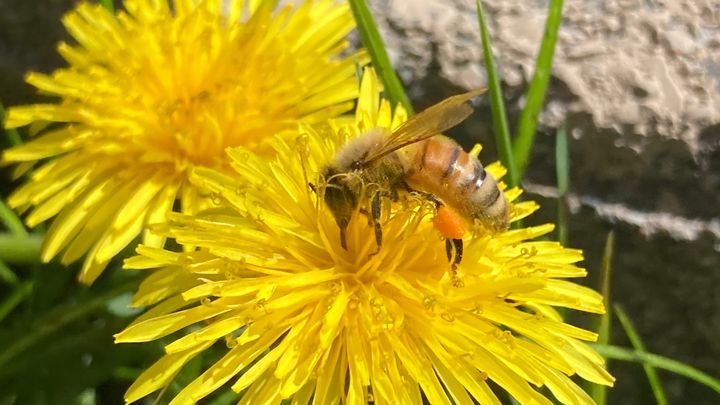
Fund Vital Testing to Save the Pollinators: Northern Ontario
Donation protected
My name is Dawn Lalonde, I am one of nearly 200+ Beekeepers in the Sudbury District. This past Friday June 14th, 2024 was an absolutely beautiful day to go check my beehives located in Lively (Ward 2 of Greater City of Sudbury). Sun was shining down across a farm field filled with wild flowers. The milkweed was just starting to come up, in anticipation of the Monarch Butterflies return to the North.
Everything was text book perfect until I hopped out of my truck to an apocalyptic eerie silence. There was no buzz to be heard, no bee to be seen in flight.
I checked the time, the temperature, the wind ... in a bees world it was perfect day. With nearly 20 colonies in the field I should have been standing in the midst of a symphony of honey bees scurrying off to forage and even more younger bees in midst of their first orientation flights. Not a hum or a buzz in the air!
Bewildered I started recording on my phone. "This makes no sense" I kept saying like a broken record. I have been beekeeping in this area for nearly a decade. Perplexed I lit my smoker, turned off the electric fence and suited up.
By the time I had looked in my 4th colony I was calling colleagues and the Provincial Inspectors (who had recently inspected this yard for pests and disease, only weeks prior).
There was piles of dead bees on the ground in front of the colonies and what should have been two deep boxes bursting at the seams of bees, were single boxes with a mere handful.
It was becoming apparent what little bees were left in these hives were struggling. They had resources within the boxes; nectar, honey, pollen, bee bread. Just a Queen, a handful of bees barely enough to keep the colony warm at night and little to no foragers.
As beekeepers in Northern Ontario we expect an average of 30% winter loss. We also need to be diligent & proactive in our hive management to ensure our Honeybees, which are livestock, are free of disease & pests. I and many of my colleagues work tirelessly to ensure we have strong healthy colonies as well as educate and support new beekeepers across the north.
This was "not" winter loss!! This was a beekeeper's worst nightmare!!
At this time, my colleagues and I have concluded it is most likely something (such as pollen or nectar) these colonies foraged on and/or consumed within a 1.5 to 2 mile radius of the beeyard. We have not excluded any an all possibilities but to see such a drastic loss at this time of the year there is concerns it may be caused from contact with a chemical.
For me as a beekeeper, there is not much I can do besides dust off my knees, wipe away the tears and try and save the remaining handful of bees. I will need to relocate these colonies and I am blessed beekeepers live by the adage "Beekeepers Helping Beekeepers".
Why a Go Fund Me? This is "not" to assist my business(es) recoup the losses it will face with regards to the loss in honey crop, livestock, equipment, and costs to rebuild this portion of my operation. This must be made perfectly clear. This is farming and as much as this hurts me financially that is not the goal of this fund, and others have been put in place to assist in ensuring all proceeds go to the testing required to find the cause.
In order to find the cause extensive testing needs to take place through the Agriculture & Food Laboratory (AFL) unit of the Laboratory Services Division at the University of Guelph.
"The AFL provides analytical support for a broad range of bee-specific matrices such as adult bees, brood/pupae, bee bread, pollen, honey, wax* and nectar. Seven neonicotinoid class pesticides can be detected by our GC/LC-MS/MS multi-residue pesticide screen, TOPS-142."
With a cost of $302.95 per sample, the number of colonies and samples per colony required to properly rule out and/or find a cause of such a severe and sudden loss in honey bees far exceeds my individual financial means.
As a beekeeper, I feel an obligation to put this at the forefront not just for my fellow beekeepers or to find closure; most importantly we as a community and as stewards of the environment need to turn this focus towards how this may be impacting the local "native" pollinators. If there are literally thousands upon thousands of dead bees in these fields, how many did not return? What about the bumble bees? The Monarchs? The other wildlife?
There is no guarantee these tests will find what we are looking for but I truly believe it is our duty as a community to rally together to see if there is a way to not just help the area beekeepers but first and foremost the native pollinators.
We all say we want to save the bees and here is our chance once again. Please do not let my honeybees' deaths be in vain.
Thank-you all in advance. Peace, Love & Understanding
*Any funds remaining following the initial testing it will be used to assist others who meet certain criteria and or for educational purposes.
Organizer
Dawn Lalonde
Organizer
Lively, ON